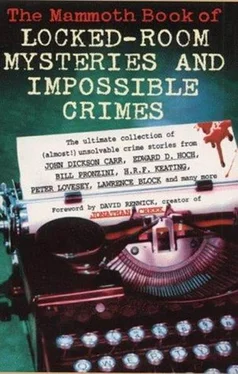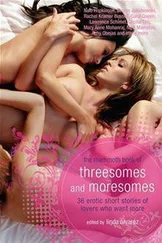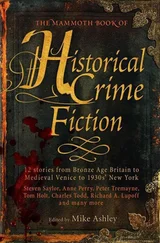Mike Ashley - The Mammoth Book of Locked-Room Mysteries And Impossible Crimes
Здесь есть возможность читать онлайн «Mike Ashley - The Mammoth Book of Locked-Room Mysteries And Impossible Crimes» весь текст электронной книги совершенно бесплатно (целиком полную версию без сокращений). В некоторых случаях можно слушать аудио, скачать через торрент в формате fb2 и присутствует краткое содержание. Жанр: Детектив, на английском языке. Описание произведения, (предисловие) а так же отзывы посетителей доступны на портале библиотеки ЛибКат.
- Название:The Mammoth Book of Locked-Room Mysteries And Impossible Crimes
- Автор:
- Жанр:
- Год:неизвестен
- ISBN:нет данных
- Рейтинг книги:3 / 5. Голосов: 1
-
Избранное:Добавить в избранное
- Отзывы:
-
Ваша оценка:
- 60
- 1
- 2
- 3
- 4
- 5
The Mammoth Book of Locked-Room Mysteries And Impossible Crimes: краткое содержание, описание и аннотация
Предлагаем к чтению аннотацию, описание, краткое содержание или предисловие (зависит от того, что написал сам автор книги «The Mammoth Book of Locked-Room Mysteries And Impossible Crimes»). Если вы не нашли необходимую информацию о книге — напишите в комментариях, мы постараемся отыскать её.
A new anthology of twenty-nine short stories features an array of baffling locked-room mysteries by Michael Collins, Bill Pronzini, Susanna Gregory, H. R. F. Keating, Peter Lovesey, Kate Ellis, and Lawrence Block, among others.
The Mammoth Book of Locked-Room Mysteries And Impossible Crimes — читать онлайн бесплатно полную книгу (весь текст) целиком
Ниже представлен текст книги, разбитый по страницам. Система сохранения места последней прочитанной страницы, позволяет с удобством читать онлайн бесплатно книгу «The Mammoth Book of Locked-Room Mysteries And Impossible Crimes», без необходимости каждый раз заново искать на чём Вы остановились. Поставьте закладку, и сможете в любой момент перейти на страницу, на которой закончили чтение.
Интервал:
Закладка:
The plane droned nearer. Paxton was beginning to grow dizzy from lack of air, and Julie’s arm was already plunging downward. With the last of his strength, he twisted away. His feet slid on the ice and he fell, dragging Tanya with him. They landed on something that popped under their combined weight, and a gout of cold liquid burst across the ground. Tanya went limp.
“The sample!” screamed Julie, dropping to her knees and staring in horror at the pool of dirty water that ran in rivulets across the ice. “You fell on the container and broke it!”
“And you killed Tanya,” said Paxton, struggling free of the inert body and watching blood mingle with the spilled water. The plane roared low overhead as it prepared to land, and Paxton could see people at the windows, gesticulating wildly at what he assumed they could see on the drill-house roof. “It’s over, Julie.”
Julie was white-faced as the last dribbles from the container seeped into the snow. “It was all for nothing! None of us’ll be around by the time they agree to drill another borehole.”
“You’ll be serving a prison sentence for murder, anyway,” said Paxton coldly. “You killed six of your colleagues.”
“We almost did it,” she said softly, still gazing at the pale stain. “We held it in our hands. But at least there’s some justice in all this: you ruined our plan, but with the sample gone and the drill broken, at least it won’t be you who’ll be the first one to analyze Lake Vostok.”
With a deafening roar, the plane landed a short distance away, and its passengers began to hurry towards them, pointing at the drill-house roof in horror and confusion. Julie’s shoulders sagged in defeat. Paxton withdrew the small phial of Lake Vostok water he had secreted in his pocket when the others weren’t looking, and showed it to her.
“I’d have been the first to publish the results anyway,” he said softly. “All you’ve done is ensure that I’ll succeed.”
THE MYSTERY OF THE TAXI-CAB by Howel Evans
Now we step back in time again. I know little about Frank Howel Evans. He wrote several boys’ books as Atherley Daunt at the turn of the last century, and it’s probable that he was an actor or worked in the theatre in some capacity, as many of his stories involve the stage. He even wrote a Sexton Blake novel called The Actor Detective (1905). The following comes from a series of stories Evans wrote for The Novel Magazine in 1922 and which was reworked into the book The Murder Club (1924). The Murder Club is a collection of individuals who delight in solving bizarre crimes – such as the following.
“Once more a humble person craves admission – NUMBER ONE.”
Brinsley read this out from a slip of paper at the next meeting of the Murder Club.
White-haired, beaming. Number One, was admitted with Brinsley’s butler carrying a large parcel, which he placed on a side table.
“Gentlemen,” said the Chief of the Secret Service, “just a little memento. You will understand when you see it. Good night.”
In a second the little silver-haired man of mystery had gone, and Brinsley, as President, drew the untied wrappings off the parcel and brought to light a magnificent chased gold cigar-box, on the lid of which was an inscription:
TO THE MURDER CLUB
FROM
NUMBER ONE.
“And what’s this?” Brinsley picked up a scrap of paper which lay at the bottom of the box and read aloud:
“I rather fancy the Murder Club and The Wire will be interested in the murder of Sir George Borgham. If the mystery is solved I shall be glad of any particulars that you may not care to give to the public. Secret please – Number One.”
Brinsley grabbed for an evening journal.
“The little man gets busy,” he said. “It only happened this morning and Crimp’s on it, that’s why he’s not here. I’ll read the account, and then we shall have it in our minds clear and sharp.”
And this was the account:
“Sir George Borgham appears to have left his house in Mayer Street, Sloane Square, at about twenty minutes to ten this morning. He was driven in his car by way of Piccadilly, making a call at a bookshop there, and arrived at the Law Courts at five minutes to ten. The policeman on duty outside the Courts, knowing the famous judge’s car, opened the door as usual for Sir George to alight and make his way to the judge’s entrance. But Sir George, instead of jumping out quickly as was his habit – he was a very active man for his sixty-eight years – remained seated in the near corner, with his head sunk on his chest. His silk hat was lying on the seat by his side, and in his right hand was the book which he had bought, closed, with his finger between the pages as if to keep the place. At first the policeman thought that he was asleep, so he said to him: ‘You’re at the Courts, my lord.’ But receiving no answer, he put his head further inside the car, and instinct and experience then told him that he was looking at a dead man.
“The body of the judge was lifted out and carried into his own private room at the Law Courts.
“There is no mystery as to the cause of the death of Sir George Borgham, for, embedded in the chest up to the hilt, piercing his heart, was found a long thin piece of steel, of the shape and size of an ordinary knitting needle, and as sharp as a stiletto, with a sort of handle at the end of it made from a piece of cork.
“That, brother members, seems as far as we have got up to the present with information as to this case.”
Brinsley laid down the evening journal from which he had been reading, and looked at the members.
“It sounds like murder, doesn’t it?” said Eustace Golbourne, the professor of mathematics from Scotland. “Surely a man couldn’t kill himself by driving a thin piece of sharp steel into his heart?”
The president nodded.
“Yet men have done almost incredible things when determined to take their own lives,” he said. “I’ll ring up my office and see if anything further has come in from the police,” and he reached for the telephone at his side. “If there’s anything fresh Crimp will be at The Wire office by now.”
Brinsley spoke through to his office, and after listening to the answer, replaced the receiver.
“The only further scrap of news is,” he said, “that on the little finger of Sir George Borgham’s left hand there was tied a small piece of red tape.”
“The affair has a peculiar interest for me,” put in a round jolly-faced man about fifty-eight or sixty, the Rev. Thomas Bowen, of Cornwall, the greatest living authority on the mental and moral out-look of the criminal. “A sad interest, indeed, for only last night I saw Sir George at the Athelonian Club, of which I’m a country member, and we had quite a long chat together.”
“That’s interesting, Mr Bowen!” said Brinsley. “Did you know him well?”
“Not very well,” answered the clergyman. “Just well enough for us to be pleased to see each other when I happened to come into the club and find him there, and to enjoy a little chat together. A genial and a learned man was Sir George.”
“Yes,” agreed Brinsley. “Though I daresay, as a judge, he had a good many enemies. He has sent a lot of people to prison in his time, and hanged more than one. Revenge may have been the motive for the crime.”
There came a gentle knock at the door, and Brinsley’s manservant entered with a parcel, which the newspaper proprietor rapidly tore open.
“As I expected, gentlemen,” he said, “here is the official photograph of the weapon with which the crime was committed. One, of course, has gone to every newspaper office in the kingdom, circulated by the police, and as a special favour, I asked Scotland Yard to let me have one here.”
Читать дальшеИнтервал:
Закладка:
Похожие книги на «The Mammoth Book of Locked-Room Mysteries And Impossible Crimes»
Представляем Вашему вниманию похожие книги на «The Mammoth Book of Locked-Room Mysteries And Impossible Crimes» списком для выбора. Мы отобрали схожую по названию и смыслу литературу в надежде предоставить читателям больше вариантов отыскать новые, интересные, ещё непрочитанные произведения.
Обсуждение, отзывы о книге «The Mammoth Book of Locked-Room Mysteries And Impossible Crimes» и просто собственные мнения читателей. Оставьте ваши комментарии, напишите, что Вы думаете о произведении, его смысле или главных героях. Укажите что конкретно понравилось, а что нет, и почему Вы так считаете.










